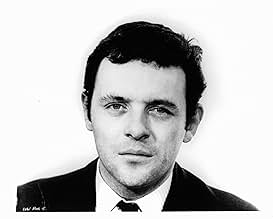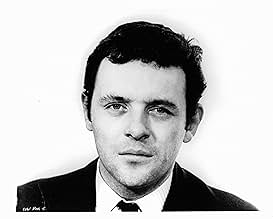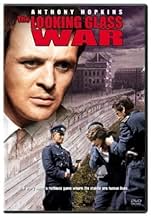IMDb RATING
5.8/10
1.6K
YOUR RATING
From the John le Carré novel about a British spy who sends a Polish defector to East Germany to verify missile sites.From the John le Carré novel about a British spy who sends a Polish defector to East Germany to verify missile sites.From the John le Carré novel about a British spy who sends a Polish defector to East Germany to verify missile sites.
Featured reviews
Most of the reviews I have given are of films that I saw at the cinema upon its release and have then recently watched again. However, THE LOOKING GLASS WAR is a movie that I never got around to watching at the pictures, therefore, I decided to shell out 3 pounds and buy the DVD. I must say that I am glad I did as I quite enjoyed it. A young Christopher Jones plays a Polish seaman who is recruited by British Intelligence to go into East Germany to check out some missiles in return for being given leave to stay in the UK. The acting was better than I thought it would be and the storyline was OK. I liked the jazzy soundtrack as well. Not a bad film at all and worth the 3 quid I paid.
Although undeniably the weakest of the three John Le Carre novels to be filmed during the 1960's this is not quite as bad some would have us believe. It proved to be one of only two features to be directed by Frank R. Pierson, the other being the third version of 'A Star is Born'. The latter film at least made money despite a critical drubbing whereas this one failed on both counts.
There are some redeeming features here, notably the cinematography of Austin Dempster and first class performances from Ralph Richardson, Paul Rogers, Robert Urquart and Anthony Hopkins who is slowly moving up the ranks. Hopkins freely admitted that his ambition was to be an international film star and in time would certainly be granted his wish!
The weak link is Christopher Jones whose rather quirky personality at first appeals but then becomes rather tiresome. He is working through his James Dean complex here and in the role of a Pole is not very well dubbed. He was to be even more miscast in 'Ryan's Daughter' which proved to be another nail in his coffin. Also disappointing is Pia Degermark as the love interest. Having shone in 'Elvira Madigan' she is rather bland here and despite her off-screen relationship with Jones there is precious little chemistry.
Even by the author's standards the material is pretty bleak and Mister Pierson alas is not in the same league as Messrs. Ritt and Lumet.
Where it does succeed admirably is in depicting the soul-destroying and morally ambiguous nature of the Espionage business where human beings are nothing if not expendable.
"War is hell, Mr. Thornhill. Even when it's a Cold one"!
26/04/2021: Congrats to Mr. Hopkins on his well-deserved Academy Award.
There are some redeeming features here, notably the cinematography of Austin Dempster and first class performances from Ralph Richardson, Paul Rogers, Robert Urquart and Anthony Hopkins who is slowly moving up the ranks. Hopkins freely admitted that his ambition was to be an international film star and in time would certainly be granted his wish!
The weak link is Christopher Jones whose rather quirky personality at first appeals but then becomes rather tiresome. He is working through his James Dean complex here and in the role of a Pole is not very well dubbed. He was to be even more miscast in 'Ryan's Daughter' which proved to be another nail in his coffin. Also disappointing is Pia Degermark as the love interest. Having shone in 'Elvira Madigan' she is rather bland here and despite her off-screen relationship with Jones there is precious little chemistry.
Even by the author's standards the material is pretty bleak and Mister Pierson alas is not in the same league as Messrs. Ritt and Lumet.
Where it does succeed admirably is in depicting the soul-destroying and morally ambiguous nature of the Espionage business where human beings are nothing if not expendable.
"War is hell, Mr. Thornhill. Even when it's a Cold one"!
26/04/2021: Congrats to Mr. Hopkins on his well-deserved Academy Award.
A uniformed boarder guard actually says "Your papers please!" in this drab adaptation of John Le Carre's novel (with Bergmanesque visuals from cameraman Austin Dempster).
First-time director Frank R. Pierson had recently received two Oscar nominations as a scriptwriter when Columbia gambled upon his ability to direct a feature film. Columbia lost, it went out on the graveyard shift in February and Pierson went back to TV for several more years.
Both leads were blessed with sullen good looks but not the ability to speak English and soon disappeared. Fortunately they're backed by a fine line-up of British acting talent who are the ones who make the film worth watching. (As in the earlier Le Carre adaptation 'The Deadly Affair' time is devoted to the unhappy home lives of the minders; and again it's not a pretty sight.)
First-time director Frank R. Pierson had recently received two Oscar nominations as a scriptwriter when Columbia gambled upon his ability to direct a feature film. Columbia lost, it went out on the graveyard shift in February and Pierson went back to TV for several more years.
Both leads were blessed with sullen good looks but not the ability to speak English and soon disappeared. Fortunately they're backed by a fine line-up of British acting talent who are the ones who make the film worth watching. (As in the earlier Le Carre adaptation 'The Deadly Affair' time is devoted to the unhappy home lives of the minders; and again it's not a pretty sight.)
During the Cold War, the British Intelligence receives a blurred photograph from East Germany taken from Hamburg and Director LeClerc (Ralph Richardson) believes that they are missiles. Their agent Taylor King (Timothy West), who receives a film that might clarify the detail from a pilot in Finland, is found dead on the road and the police believe that he was accidentally killed in a hit-and-run. LeClerc meets the Polish defector Fred Leiser (Christopher Jones), who jumped overboard from a ship expecting to have asylum and stay with his British girlfriend (Susan George) that is pregnant, and decides to recruit him to cross the border and spy the Eat German facility to check the missiles. In return, he would have salary, insurance and political asylum. Leiser is trained by the agent and family man John Avery (Anthony Hopkins) and soon he finds that his girlfriend has had an abortion. When Leiser crosses the border, he stumbles with the local Anna (Pia Degermark) and they stay together in the beginning of a dangerous journey where he is just a pawn in a war game.
"The Looking Glass War" is a dated thriller with a disappointing story. The characters are poorly developed and it is hard to understand the motivation of Leiser in his assignment after discovering that his girlfriend had forced an abortion. He is neither British nor an idealistic man to risk his life in a suicidal mission. Actually it is difficult to understand who he is since he is capable to kill two men in cold blood, slap the face of his girlfriend and let Anna with him knowing that his mission is compromised. The betrayal of LeClerc is the great plot point in the story but also difficult to understand why he plots all operation apparently to justify his agency and get rid off a defector. In the end, there is no consequence receiving or not the message from Leiser. My vote is six.
Title (Brazil): Not Available
"The Looking Glass War" is a dated thriller with a disappointing story. The characters are poorly developed and it is hard to understand the motivation of Leiser in his assignment after discovering that his girlfriend had forced an abortion. He is neither British nor an idealistic man to risk his life in a suicidal mission. Actually it is difficult to understand who he is since he is capable to kill two men in cold blood, slap the face of his girlfriend and let Anna with him knowing that his mission is compromised. The betrayal of LeClerc is the great plot point in the story but also difficult to understand why he plots all operation apparently to justify his agency and get rid off a defector. In the end, there is no consequence receiving or not the message from Leiser. My vote is six.
Title (Brazil): Not Available
Frank Pierson made a very ambitious bet when he wrote the screenplay and directed the film version of John Le Carré's The Looking Glass War. I admire that ambition, but he only partially succeeded. The novel is a bitter, dark and gritty tale, with lots of satire, of old spymasters reliving their past glories. For that reason they are not up to the job of managing a modern and "Cold" War. Instead of "simply" telling that great and worthy story, Pierson seems to have been inspired by the Swinging 60's, with counterculture movements and young people everywhere pushing back against previous generations, to make an even bigger and more flamboyant statement of generational angst than Le Carré intended. This might have worked if executed well, but a few mistakes undercut him. He chose two beautiful, quirky, fast-rising stars, Christopher Jones and Pia Degermark as the leads. Jones' recruitment scenes were not believable, and neither was Degermark's two deus ex machina moments of entering the spy's life. But they were very nice to watch, and the very good cinematography helped, too. A few other turn-offs, for me were several tedious segments when I thought Pierson was channelling Michelangelo Antonioni, location shots that do not look like anyplace I've ever seen in Germany, as well an overly abrupt ending. In the end Pierson seems to have abandoned Le Carré's biting satire, and he jumbled the shift to generational angst.
Did you know
- TriviaA radio play of John le Carré's novel "The Looking Glass War" was produced and broadcast by Radio 4 in 2009, with Simon Russell Beale as George Smiley, Piotr Baumann as Leiser, Patrick Kennedy as Avery, and Ian McDiarmid as LeClerc. This radio play featured the George Smiley character, who had been dropped for this movie.
- GoofsThe photograph of a railway yard that was the pretext for the mission was supposedly taken in East Germany but the locomotive in the picture is immediately recognizable to any ex-trainspotter as a British Rail type manufactured by English Electric.
- Quotes
Leiser: What's your name?
John Avery: You can't have my name, it's a breach of security.
Leiser: You know, I'm risking my life for you so I want a name, give me a name, I don't care. Any name!
John Avery: John.
Leiser: John. John.
- ConnectionsFeatured in Al Murray's Great British Spy Movies (2014)
- How long is The Looking Glass War?Powered by Alexa
Details
- Release date
- Country of origin
- Official site
- Languages
- Also known as
- The Looking Glass War
- Filming locations
- Spain(made on location in Europe, kinema weekly 19/10 68)
- Production companies
- See more company credits at IMDbPro
Box office
- Gross US & Canada
- $168,000
- Runtime1 hour 48 minutes
- Color
- Aspect ratio
- 2.35 : 1
Contribute to this page
Suggest an edit or add missing content








































